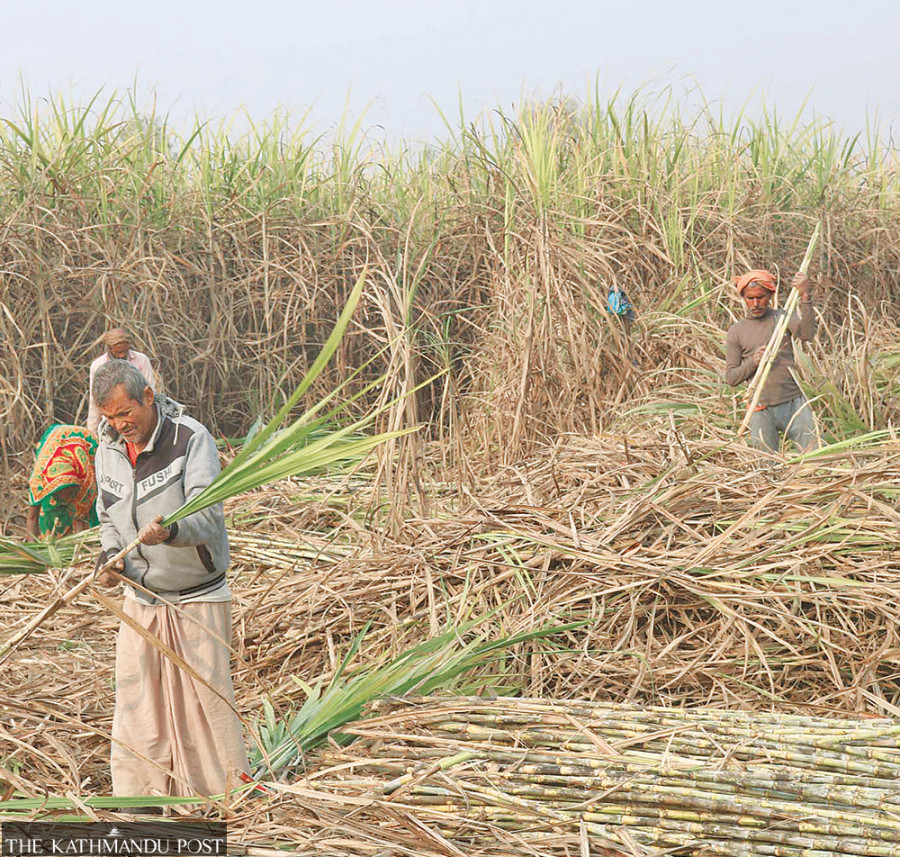Money
Government admits sugar mills still owe Rs80 million to farmers
Himalayan Sugar Mill, Annapurna Sugar Mill, Lumbini Sugar Mill and Indira Sugar Mill have not paid sugarcane farmers for their crops, officials say
Krishana Prasain
The government on Tuesday admitted that sugar mills in the Tarai still owe Rs80.70 million to sugarcane farmers for their crops, swallowing its words that no amounts remained outstanding.
Last Friday, Arjun Prasad Pokharel, secretary of the Ministry of Industry, had claimed that the sugar mills had cleared their debts to the farmers. “We have no information about any huge amount still owed by the mills,” he had told the Post.
But on Tuesday, Dinesh Bhattarai, secretary of the Ministry of Commerce and Supplies, revealed to the parliamentary Public Accounts Committee that four sugar mills have to pay a combined sum of Rs80.70 million to the sugarcane farmers.
Bhattarai told the House panel that the ministry had frozen the assets of the defaulting mills.
According to Bhattarai, Himalayan Sugar Mill in Siraha, Annapurna Sugar Mill in Sarlahi, Lumbini Sugar Mill in Nawalparasi and Indira Sugar Mill in Nawalparasi are in arrears for massive sums.
"The details of the monies owed by each of these sugar mills are yet to be received," he said. “The dues initially totalled Rs1.40 billion,” Bhattarai told the Post.
“Around 95 percent of the arrears have been cleared. We are working on making the mills pay the remaining dues. We will call the sugar mill owners and discuss the matter,” Bhattarai said.
Rakesh Mishra, patron of the Sugarcane Farmers Struggle Committee, recently told the Post that the mills still owe Rs130 million to the cane farmers.
In December 2020, a group of cane farmers had come to Kathmandu and organised a two-week-long protest to press the government to make the sugar mills pay their dues.
On December 28, 2020, farmers called off their strike following an assurance from the government that the delinquent mills would pay them within 21 days.
The sugarcane farmers have come to Kathmandu twice during the winter season to get their money, and returned home each time after the government promised that the mills would be made to pay them.
“But the mills still owe the farmers millions,” said Mishra.
According to the Federation of Sugarcane Producers Association, sugarcane production has been declining continuously since 2012.
Output has plunged by around 50 percent as farmers faced heavy losses following delays in payment for their crops and delays in the announcement of the minimum support price every year.
Sugarcane farmers say that the price of sugarcane has not increased since 2005 while the price of sugar has swelled to Rs90 per kg from Rs62. Moreover, sugarcane farmers do not get paid for their harvest on time, and they need to hold protests to get their money.
Sugarcane farmers have been coming to Kathmandu every year for the past two years to protest because sugar mills have not been paying them for their crops.
This year too they have planned to hold an agitation. “We are planning to come to Kathmandu again to hold another protest. We would have come already; but as it is very cold in the valley right now, we have postponed our trip because we lost a farmer during last year’s protest,” Mishra said.
Sugarcane farmer Narayan Raya Yadav of Sarlahi, who had come to the Capital to participate in a sit-in against non-payment of dues by the sugar mills in December 2020, died of a heart attack.
Sugarcane farmers have also been complaining against the habitual delays by the government in fixing the minimum support price for their crops.
The minimum support price is the price the government guarantees to pay farmers for their harvest if the bottom drops out of the market.
The floor price is the lowest price that can be charged for a commodity. The measure is intended to encourage farmers to grow crops. The price is computed based on the cost of production, transportation charges and inflation.
In 2012, the government announced that it was resuming the policy of fixing the minimum price of paddy following complaints that middlemen were determining the market rate. It was implemented only in 2016.
After paddy, the government started fixing the minimum support prices of other crops too.
However, even when the minimum price was announced, it was not done before the beginning of the planting season, so it was no help to the farmers to make production decisions, reports said.
Farmers in most Tarai districts started harvesting their sugarcane crops from December-end, but the government has not yet fixed the minimum support price.
"The mills should have begun crushing sugarcane from mid-December, but it has not started because the government has not fixed the minimum support price," Mishra said. "The government and sugar mill owners are giving the farmers a hard time by not fixing the support price of sugarcane on time," he charged.
The Ministry of Agriculture and Livestock Development said that it had sent the suggested minimum support price for sugarcane to the Industry Ministry. The Industry Ministry will table the proposal at the Cabinet for its in principle approval to implement the new price this year.




 9.89°C Kathmandu
9.89°C Kathmandu















